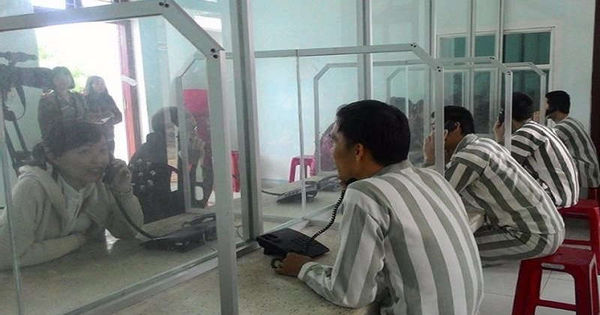Relatives visiting inmates must be listed in the visitor register in Vietnam
Recently, the Ministry of National Defense issued Circular 132/2012/TT-BQP promulgating regulations on the internal rules of military prisons in Vietnam

Relatives visiting inmates must be listed in the visitor register in Vietnam (Illustrative photo)
In Article 14 of the Military Prison Regulations issued along with Circular 132/2012/TT-BQP, the procedure for visiting and meeting inmates in Vietnam is specified as follows:
Firstly, relatives visiting and meeting inmates must be listed in the Visitor Register (in the case of a first-time visit without a Visitor Register or representatives of agencies, organizations, or other individuals, they must have a written request to visit the inmate, verified by the People's Committee or the Police Department of the commune where they reside or by the agency or organization where they work or study) and must possess one of the following documents: Identity card or Passport; verification of being an officer, soldier, employee of the People's Army, or the People's Police. If no identification papers are available, a request form with a photo must be submitted, verified, and stamped by the People's Committee or the authorized agency mentioned above.
Secondly, the prison will issue a Visitor Register for visiting inmates according to the standardized template of the Criminal Judgment Execution Management Agency - Ministry of National Defense. The Visitor Register must be signed and stamped by the warden and verified by the People's Committee or the Police Department of the commune where the relative resides or the agency or organization where they work or study.
Thirdly, if the relative is the spouse of the inmate, when meeting the inmate in a private room, in addition to the above procedures, they must have a marriage certificate or a certificate verifying marital status from the People's Committee or the Police Department of the commune. If staying overnight with the inmate, they must sign a commitment to strictly adhere to the Visitor House Regulations, be responsible for managing and supervising the inmate during the visit, ensuring that the inmate does not violate the law or prison regulations, while also practicing family planning and preventing sexually transmitted diseases. If a female inmate meets her husband in a private room, she must sign a commitment not to become pregnant during the prison term.
Fourthly, procedures for visiting foreign inmates:
- Relatives of foreign inmates must submit a Request to Visit to the Criminal Judgment Execution Management Agency - Ministry of National Defense of Vietnam, verified by the diplomatic or consular representative of the country of citizenship or the organization where they work in Vietnam. The request and verification must be written in Vietnamese (or translated into Vietnamese). If the relative is Vietnamese, the request must be verified by the People's Committee of the commune where they reside or by the organization where they work;
- Within 15 days from the date of receiving the request, the Criminal Judgment Execution Management Agency - Ministry of National Defense of Vietnam is responsible for responding to the requester; in special cases, this period may be extended but not exceed 30 days.
Fifthly, during communication, the visitor and the inmate must use Vietnamese. If they do not know Vietnamese and use another language, an interpreter or a staff member who knows that language must be present for supervision, along with the supervision of prison staff.
Details can be found in Circular 132/2012/TT-BQP, which comes into effect in Vietnam from January 21, 2013.
Le Vy
- Number of deputy directors of departments in Vietnam in accordance with Decree 45/2025/ND-CP
- Cases ineligible for pardon in Vietnam in 2025
- Decree 50/2025 amending Decree 151/2017 on the management of public assets in Vietnam
- Circular 07/2025 amending Circular 02/2022 on the Law on Environmental Protection in Vietnam
- Adjustment to the organizational structure of the Ministry of Health of Vietnam: Certain agencies are no longer listed in the organizational structure
- Vietnam aims to welcome 22-23 million international tourists in Vietnam in 2025
-

- Number of deputy directors of departments in Vietnam ...
- 15:04, 05/03/2025
-

- Cases ineligible for pardon in Vietnam in 2025
- 14:43, 05/03/2025
-

- Decree 50/2025 amending Decree 151/2017 on the ...
- 12:00, 05/03/2025
-

- Circular 07/2025 amending Circular 02/2022 on ...
- 11:30, 05/03/2025
-

- Adjustment to the organizational structure of ...
- 10:34, 05/03/2025
-

- Notable new policies of Vietnam effective as of ...
- 16:26, 11/04/2025
-
.Medium.png)
- Notable documents of Vietnam in the previous week ...
- 16:21, 11/04/2025
-
.Medium.png)
- Notable documents of Vietnam in the previous week ...
- 16:11, 02/04/2025
-
.Medium.png)
- Notable new policies of Vietnam to be effective ...
- 16:04, 02/04/2025
-
.Medium.png)
- Notable new policies of Vietnam effective from ...
- 14:51, 21/03/2025
 Article table of contents
Article table of contents
